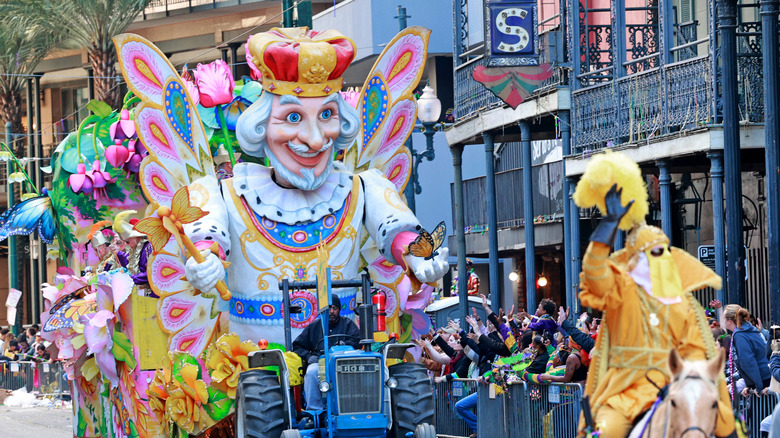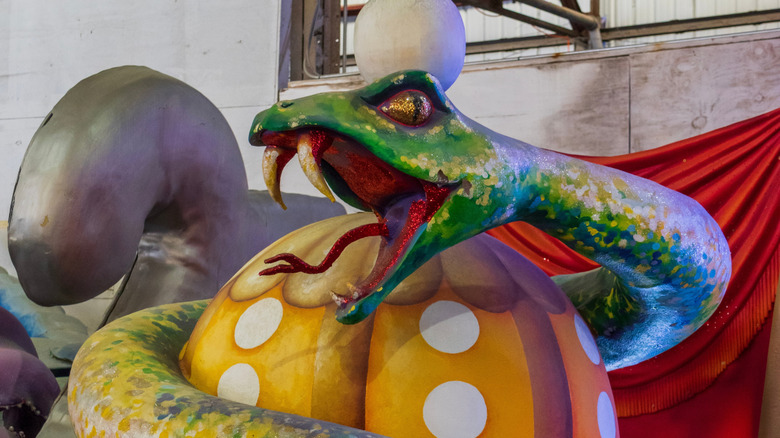The Unusual Thing New Orleans Bans At Mardi Gras Parades
When I lived in New Orleans I saw some pretty wild things during Mardi Gras parades. Mardi Gras season, also known as Carnival season, starts on January 6 and runs to the Tuesday before the beginning of the Christian observance of Lent. That means there are a lot of chances for revelers to let loose and, in general, they can get away with behavior that wouldn't fly the rest of the year. Even so, there are apparently some things that you just better not try during the many Mardi Gras parades around the city, even in New Orleans' permissive atmosphere. Strangely, it has to do with reptiles.
Like most states, Louisiana has some weird laws, but unlike most states, there are also a fair amount of alligators, snakes, and lizards. Sometimes they come together, like the New Orleans law forbidding you to tie an alligator to a fire hydrant (which is kind of a moot point since there's also a law on the books against keeping alligators as pets). In a similar vein, the Big Easy is also uptight about bringing reptiles to any Mardi Gras parades. That's right, the New Orleans City Council has a specific law on the books, Section 34-21, dealing with this issue.
Mardi Gras and reptiles don't mix, apparently
While the reason the New Orleans City Council felt the need to ban reptiles at Mardi Gras parades has been lost to time, the ordinance gets pretty specific. You can't bring your pet reptile "within 200 yards of a carnival parade route during a carnival parade or the pendency of a parade," per the city code. An older version of the law went further and stipulated you couldn't have reptiles near Mardi Gras parades two hours before and one hour after the event. But, apparently, the city council felt it had gone too far with the time constraints on reptile owners.
The law doesn't specify the penalty for bringing your reptile to a parade, nor does it clearly define the term reptile, nor provide any possible exceptions. But another part of the city code at least helps a bit by describing what "exotic" reptiles you can and cannot legally own in New Orleans. So, it's a no-go for alligators, crocodiles, caiman, or gharials, but box and aquatic turtles are fine as are non-venomous or constricting snakes that don't get bigger than 3 feet long. There's nothing on lizards at all. Needless to say, if your pet is scaly and cold-blooded, leave it home. But amphibians, on the other hand, might not get you in trouble since there's nothing on the books banning them from parades.
New Orleans cracks down
During Mardi Gras in 2024, Louisiana Department of Wildlife and Fisheries officers were out in the French Quarter, the New Orleans neighborhood near many of the Mardi Gras parades, busting illegal reptile owners and confiscating their pets. All told, the officers cited four people for illegal snakes and another for selling turtles without a license. They also confiscated a nearly 15-foot-long python and two slightly smaller pythons. The penalty for illegally possessing a reptile is a $500 fine and up to 90 days in jail. It should be noted that the LDWF officers weren't specifically enforcing the city's ban on reptiles near parades, but rather the state and city laws on owning exotic pets.
The same law that bans reptiles at Mardi Gras parades also bans horses that aren't part of the parade or being used by the police. Elsewhere in the city code, dogs are also banned from parades, except for ones specifically featuring them. Yes, there is a Mardi Gras parade called Barkus with costumed dogs, and it's as cute as you'd expect. While some of Louisiana's laws can be a bit strange, it's not the only state with odd-ball ordinances on the books. For instance, in New Hampshire, one of their weirdest laws is that it's illegal to pick seaweed, and in Nebraska, it's unlawful to serve a drink that includes a combination of liquor and beer. That's one law that wouldn't fly in New Orleans, with its easy-going attitude to alcohol. But, reptiles, that's another matter.


